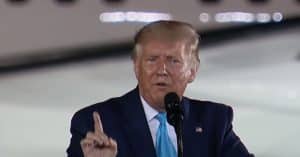Trump To Contest Biden's Federal Remote Work Deal; Unions to Defend
Trump Challenges Biden's Federal Remote Work Arrangement
President-elect Donald Trump is poised to legally challenge a policy from President Joe Biden that allows federal employees to work remotely. The contentious policy facilitates hybrid working arrangements through 2029, which Trump aims to overturn.
Under the current administration, this telework agreement affects approximately 49,000 federal workers, facilitating flexible work locations until October 25, 2029. The arrangement was a result of negotiations between the American Federation of Government Employees (AFGE) and the Social Security Administration (SSA).
Although Trump describes the overall transition of power as amicable, he specifically criticized this policy, asserting that it unnecessarily extends remote work privileges and represents a union favor. He has vowed to challenge the policy in court with the support of his newly formed Department of Government Efficiency.
Trump's Critiques and Plans for Revocation
Trump, alongside appointees Elon Musk and Vivek Ramaswamy, is skeptical of the benefits that the telework policy purportedly offers. Both Musk and Ramaswamy, known for their business acumen, have criticized the efficiency of federal telework, suggesting it has bloated governmental expenditures.
Expressing his dissatisfaction, Trump plans to dismantle the agreement by legal means, indicating a sharp policy reversal from the current telework-friendly stance. "It involved 49,000 people for five years. They don't have to go. They just signed this thing. It's ridiculous. So it was like a gift to a union, and we're going to obviously be in court to stop it," Trump stated, emphasizing the perceived misuse of policy under Biden's administration.
Union and Advocates Support Telework
Conversely, AFGE National President Everett Kelley has defended the telework policy, citing its legal standing and benefits in enhancing federal operations, productivity, and emergency preparedness. Kelley highlighted that not all federal employees are eligible for telework, refuting claims of its widespread application.
Kelley reassures that "Collective bargaining agreements entered into by the federal government are binding and enforceable under the law. We trust the incoming administration will abide by their obligations to honor lawful union contracts. If they fail to do so, we will be prepared to enforce our rights."
Adding to the political dimension of this dispute, Sen. Joni Ernst has criticized the policy as well, supporting a complete reversion to pre-pandemic working conditions. "It was unacceptable," Ernst declared, vowing to "work with Musk, Ramaswamy, and DOGE to fix this ASAP and get bureaucrats back to work."
Implications for the Future of Federal Work Policies
The ongoing controversy sets the stage for a potentially disruptive shift in federal workplace norms, balancing the flexibility introduced during the COVID-19 pandemic with the Trump administration’s preference for traditional office work.
The outcome of this legal challenge could redefine remote work policies for the federal workforce, affecting tens of thousands of government employees, and could potentially influence broader public sector employment policies in the United States.
As the debate continues, the future of federal employment remains uncertain, hinging on the resolution of this clash between the outgoing and incoming administrations.




